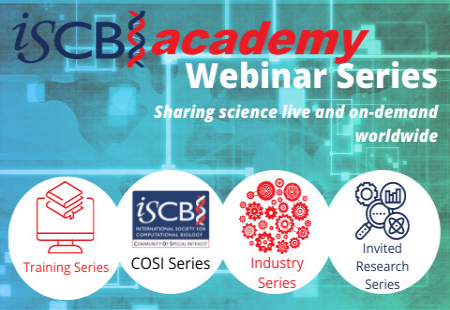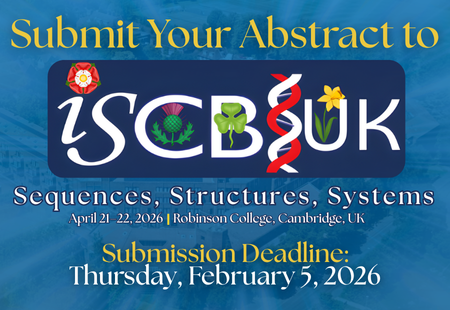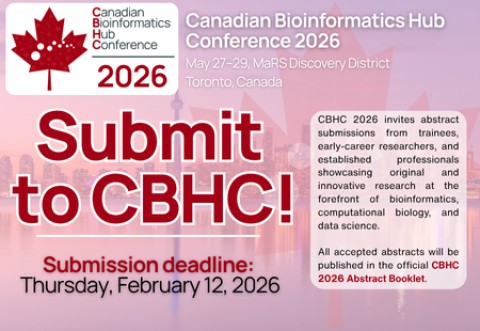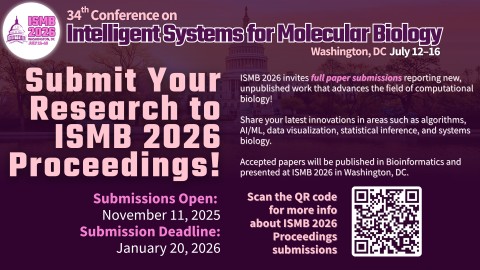EDI Panel
The GLBIO 2021 panel on equity, diversity, and inclusion (EDI) will bring together members of the community with diverse roles and backgrounds to share their perspectives on aspects of EDI that are relevant to the computational biology community. This will include discussions of The Personal, Policy, and Parameters. The Personal covers what we as individual scientists can do to foster EDI in our work and broader lives. Policy covers what our institutions, such as departments and schools, can do. Parameters cover the data side of EDI in computational biology, including promoting EDI in the data collection, analysis, interpretation, and dissemination of and for our scientific work. All GLBIO attendees will have the opportunity to share their own experiences with the panelists ahead of time through an anonymous survey. We look forward to an engaging and enlightening discussion with our most esteemed panelists.
Sponsors

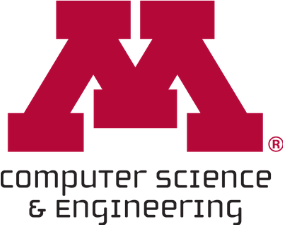
- top -
 |
Edgar Arriaga
University of Minnesota
United States of America
Moderator
|
Joey Chamard
University of Sherbrooke Canada |
 |
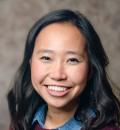 |
Trang T Le
University of Pennsylvania
United States of America |
Tijana Milenkovic
University of Notre Dame
United States of America
|
 |
 |
Melyssa Minto
Duke University
United States of America |
Russell Schwartz
Carnegie Mellon University
United States of America |
 |
 Edgar Arriaga
Edgar Arriaga
University of Minnesota
United States of America
Moderator
Dr. Edgar Arriaga (He/him) is the Northey Professor of Chemistry at the University of Minnesota, Minneapolis, MN, USA. After earning a “Licenciatura” (BSc.) degree at the Universidad del Valle de Guatemala in 1985, Edgar sought opportunities to pursue graduate school and moved to Halifax, Nova Scotia, Canada. The love for science was stronger than the culture shock he experienced and Edgar completed a Ph.D. in Chemistry from Dalhousie University in 1990. It took him two postdoctoral appointments, one at the University of Kansas Medical Center and one at the University of Alberta, to reaffirm his commitment to an academic career. Edgar joined the faculty of the Department of Chemistry at the University of Minnesota in 1990. His research on bioanalytical chemistry, supported through NIH, has been unveiling mysteries hidden by the innate heterogeneity of biological systems. His research team, a.k.a. the Organelle Group, is unique in its efforts of using novel measurements at the individual organelle level to investigate “Why we Age”. Dr. Arriaga is co-director of an NIH training grant, co-leader of the College of Science and Engineering (CSE) Diversity & Inclusivity (D&I) Alliance, Consultant for the Committee on Professional Training (CPT) of the American Chemical Society (ACS). Through these appointments and his personal life, Edgar strives to advance diversity, equity, inclusion, and respect for All.
- top -
 Joey Chamard
Joey Chamard
University of Sherbrooke
Canada
Joey started his scientific journey with a field technician degree. Then, he completed a bachelor’s degree in environmental microbiology, while working part-time in an academic laboratory. During this time, he specialized on mycorrhizae and root microbiota. Joey brings a philosophical and social point of view to everything that he’s involved, bringing refreshing and challenging questions to the everyday scientific life. In the next few years, he will be studying the interactions between the culturally and economically crucial maple trees and their relationship with the microbial communities of the rhizosphere, with an emphasis on arbuscular mycorrhizal fungi. In addition to being a passionate scientist, Joey is a multidisciplinary artist and a diversity, equity and inclusion advocate.
- top -
 Trang T Le
Trang T Le
University of Pennsylvania
United States of America
Dr. Trang Le is a postdoctoral researcher in the Computational Genetics Lab at the University of Pennsylvania. She enjoys developing machine learning methods for analyses of a wide array of biomedical data, including neuroimage, transcriptomic and genotype. She is a strong advocate for transparency in research to enable the public to engage with the work and perform peer-review.
- top -
 Tijana Milenkovic
Tijana Milenkovic
University of Notre Dame
United States of America
Prof. Milenkovic has been a Notre Dame faculty since 2010, after earning her Ph.D. degree in Computer Science from the University of California Irvine in the same year. She was promoted to an Associate Professor with tenure in 2016. She was appointed a Frank M. Freimann Collegiate Associate Professor of Engineering in 2020. Milenkovic lab solves challenging problems in the fields of network science, graph algorithms, computational biology, scientific wellness, and social networks. Prof. Milenkovic won 2015 NSF CAREER and 2016 Air Force Office of Scientific Research Young Investigator Program (AFOSR YIP) awards. Also, she has acted as the sole or lead Principal Investigator on 5 other awards by NSF or NIH. The research awards that Prof. Milenkovic has participated in total to $18.7 million. She has published 50 journal papers (e.g., in Science, PNAS, or Bioinformatics) and 16 conference papers (e.g., in ISMB/ECCB). Prof. Milenkovic's papers have attracted over 3880 citations; her i10-index is 42 and h-index is 28. Prof. Milenkovic was elected to the Board of Directors of the International Society for Computational Biology (ISCB) in 2020 to represent the Society’s Communities of Special Interest (COSIs). Prof. Milenkovic has been an Associate Editor of IEEE/ACM TCBB since 2014, of Scientific Reports since 2018, and of Frontiers in Bioinformatics - Network Bioinformatics since 2020. She has been an active organizer of the flagship Network Biology (NetBio) COSI meeting at ISMB/ECCB since 2017, and of the Great Lakes Bioinformatics Conference since 2015. Prof. Milenkovic is committed to increasing participation of women and diversity in Computer Science. She has acted as a leader of or committee member for numerous departmental-, college-, university-, and international community-level Equity, Diversity, and Inclusion (EDI) initiatives.
- top -
 Melyssa Minto
Melyssa Minto
Duke University
United States of America
Melyssa Minto(She/her) is a PhD Candidate in the Computational Biology & Bioinformatics program at Duke University where she is researching how to model transcription factor programming in maturing cerebellar granules neurons using high throughput sequencing data within the West Lab. She received a B.S. in Mathematics and a B.S. in Biology at Meredith College. Melyssa was born in Jamaica, and raised in Durham, NC. As an undocmented Black woman, she faced many hurdles getting into research which has driven her passion for diversity and equity in STEM and academia. She regularly volunteers with Black Girls Code and in local high schools. Recently, she has become heavily involved within the leadership of the Black Women in Computational Biology Network where she has helped to expand and strengthen the connections within the network and showcase the diversity within the computational biology field.
- top -
 Russell Schwartz
Russell Schwartz
Carnegie Mellon University
United States of America
Russell Schwartz is a Professor of Biological Sciences and Computational Biology at Carnegie Mellon University and Head of the Carnegie Mellon Computational Biology Department. He has worked broadly in computational biology research, with particular contributions to computational genetics/genomics and computational biophysics and with a recent focus largely on computational cancer biology. He has also been active in bioinformatics education, where he has worked on developing standards for computational biology education of both computational biology specialists and experimental biologists. He currently serves as co-chair of the International Society for Computational Biology (ISCB)’s Education Community of Special Interest (COSI) and as a member of the ISCB Board of Directors.
- top -
Presenter Information
As you plan your participation as a presenter please find below details to assist you with your specific presentation type at the conference:
- Live and Pre-recorded Talks
- Poster Presentation
- Recorded Presentation Guidelines for Virtual Events
- Live Presentation Guidelines for Virtual Events
- How to record a PowerPoint Presentation
Live and Pre-recorded Talks
Those presenting a pre-recorded talk at GLBIO 2021 should prepare their recording per the information below:
- Paper Talk (20 minute time slot) = 16 minutes talk plus 4 minutes live Q&A
- Abstract Talk (15 minute time slot) = 12 minutes talk plus 3 minutes live Q&A
- Invited Talk = check with your special session organizer for more information
Our virtual platform Showcare, has provided A Pre-recording Video Presentation Guide to further assist keynote's with their live presentation..
- Keynotes will be live and recorded for future viewing. Keynotes will have a 50 minute block. We recommend a 40 minute talk with 10 minutes each for introduction and Q&A.
Our virtual platform Showcare, has provided A Speaker Guide for Live Video Streaming to further assist keynote's with their live presentation.
Some additional helpful tips on planning your recorded talk are available below
The deadline to submit the recording is Thursday April 22, 2021.
- top -
Poster Presentations
Presenters of a poster presentation at GLBIO 2021 are allowed a maximum 5 minutes.
You need to provide the following when uploading your poster and video to Showcare via the poster portal.
- PDF of your abstract
- PDF of your poster with a maximum file size of 40mb.
- 5 minute or less flash talk as an MP4 file that is no more than 500mb
Some helpful tips on planning your recorded talk are available below
Presenting your poster in a lighting style format using the PechaKucha or Ignite talks presentation style or a single slide or PDF is an option for presenters.
Here is a example of a presentation: https://youtu.be/rbLbb7eOao8
Poster Presenters will gain access to the conference platform on Tuesday May 4, 2021. The deadline to submit your PDFs and recording is Friday, May 7, 2021.
- top -
Recorded Presentation Guidlines for Virtual Events
Download Guidlines
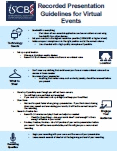
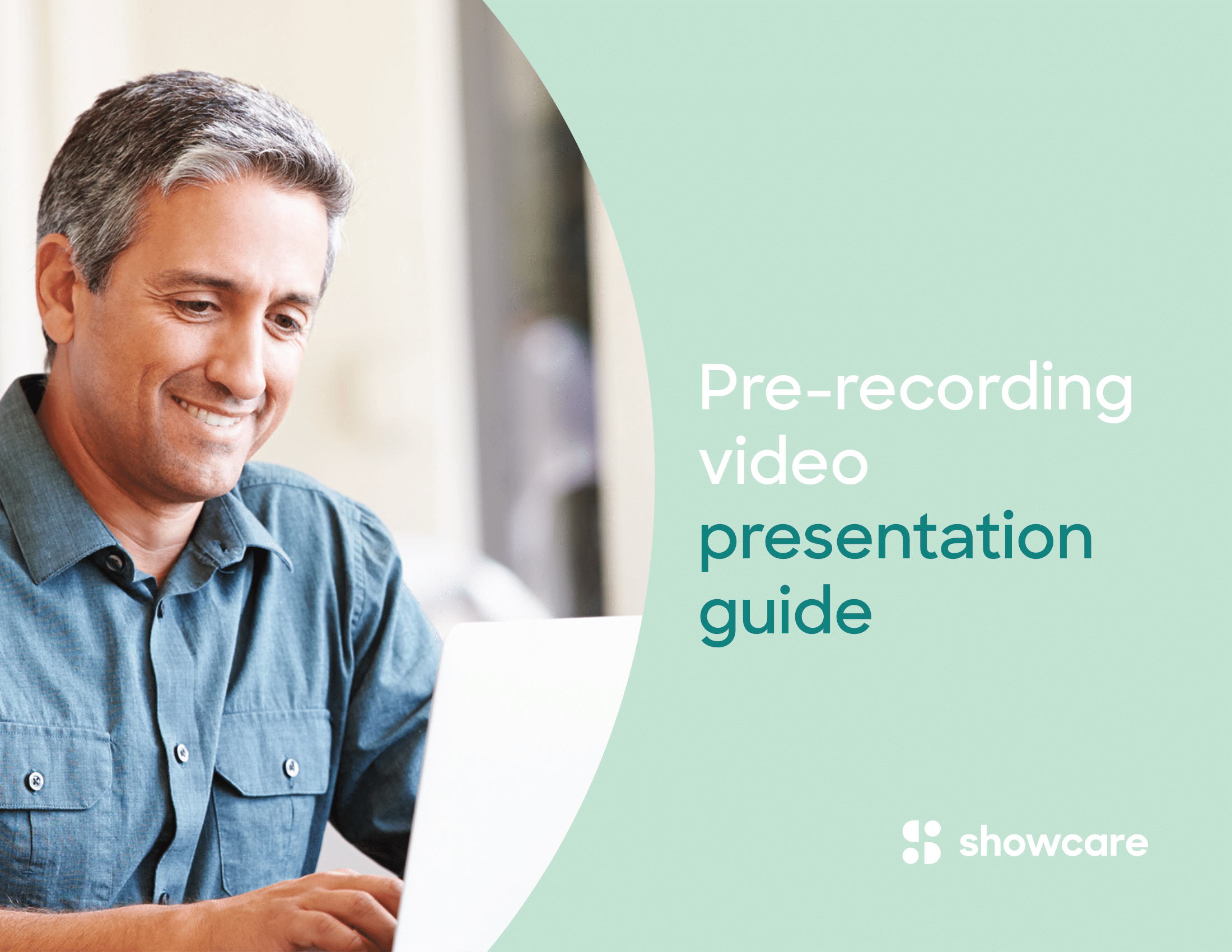
- top -
Live Presentation Guidelines for Virtual Events
Download Guidelines


- top -
How to Record a Powerpoint Presentation
How to record a power point presentation
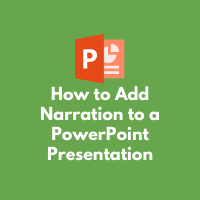
- top -
WORKSHOPS AND TUTORIALS
First Time Conference Attendance
Conferences are an essential component to the computational biology and bioinformatics communities. However, for first-time attendees, conferences may be intimidating and challenging to navigate. GLBIO has a long tradition of encouraging student/trainee participation. In fact, for many such attendees, GLBIO may be their first experience with an academic conference. The aim for this tutorial would be to provide first time conference attendees with additional information on how to navigate the meeting in order get the most out of the experience, and to build a cohort of trainees that will reduce isolation and provide ongoing support and social opportunity. Participants will work in small groups to practice talking about their work and navigating casual conversations at the conference. With much or all of the 2021 GLBIO meeting likely to be virtual, the importance of building tools for engagement is even more critical. Ultimately, we hope to increase and enhance participation in the meeting by first time attendees, in particular undergraduate students.
Organizers:
- Layla Oesper, This email address is being protected from spambots. You need JavaScript enabled to view it.
- Getiria Onsongo, This email address is being protected from spambots. You need JavaScript enabled to view it.
- Robin Shields-Cutler, This email address is being protected from spambots. You need JavaScript enabled to view it.
URL: https://sites.google.com/macalester.edu/glbio2021tutorial/home
- top -
Introduction to Deep Learning and Creating Neural Networks in Python and R
Recently, deep neural networks have become a powerful tool in bioinformatics and computational biology, which enables researchers to work with large and complex medical datasets (DNA/RNA/protein sequences, medical imaging, etc.) that can be challenging to analyze with simpler machine learning models. It is with the addition of neural networks to our computational toolkits that we have been able to make predictions from big data (predicting protein secondary structure: disease diagnosis, subtype, and treatment etc.) and discover underlying biological principles not easily identified through using other algorithms. The learning outcomes in this workshop include an introduction to deep learning and the various types of deep learning networks (ANN, CNN), how neural networks work, what they can be used for, as well as how to build a basic CNN and ANN in Python and R to assess biomedical data.
Organizer:
- Danielle Maeser, This email address is being protected from spambots. You need JavaScript enabled to view it.
- Nicole Maeser
- Quincy Gu
URL: https://maese005.wixsite.com/mysite
Max capacity: 60
- top -
Machine Learning on Microbiome Data: Theory and Practice
The workshop will focus on the theory and application of machine learning to microbiome datasets, including bacterial and viral communities. The following topics will be addressed:
- Introduction to supervised machine learning, and how to implement a machine learning workflow using R and Python.
- Applying machine learning algorithms (such as Random Forest) on microbiome datasets for disease risk prediction in humans.
- Introduction to bacteria-phage interactions, and how it contributes to bacterial pathogenicity.
- Applying machine learning methods to predict bacterial pathogenicity induced by phages.
Organizers:
- Tatiana Lenskaia, This email address is being protected from spambots. You need JavaScript enabled to view it.
- Sambhawa Priya, This email address is being protected from spambots. You need JavaScript enabled to view it.
Participation can be in-person or online, a participant will need a computer with Internet access and pre-installed R and Python.
URL: https://glbio-mlmb.github.io/
- top -
Mass Spectormetry (MS)-based multi-omics analysis using the Galaxy-P bioinformatics platform: A case study in COVID19 data analysis
The Galaxy for proteomics (Galaxy-P) team at the University of Minnesota will lead a hands-on workshop in the use of MS-based multi-omics informatics tools, using the investigation of COVID19 proteomics data as a case study. We will train participants in well-validated tools and workflows available for multi-omic data analysis within the publicly accessible Galaxy platform. We will also leverage ongoing developments of the Galaxy Training Network (GTN) which rovides online, hands-on training in complex bioinformatics tools for novice and advanced users.
Our workshop would be targeted to an audience of mixed expertise, from wet-bench scientists to data scientists and bioinformaticians. The workshop will be presented in two modules: 1) In module 1, participants will be introduced to the Galaxy platform, GTN resources, and basic usage of Galaxy for bioinformatics analysis. They will also be introduced to publicly available data and resources for COVID-19 bioinformatics analysis. 2) In the second module, researchers will be instructed in hands-on training resources and introduction to multi-omics resources focusing on tools for identification of expressed COVID19 proteins, human host proteins, and potentially co-infecting microbial components which involves integration of metagenomic and proteomic data. Tools for visualizing and interpreting results will also be discussed. Attendees will be required to bring their laptop computer so that they can access public Galaxy resources for the training.
Organizer:
- Tim Griffin, This email address is being protected from spambots. You need JavaScript enabled to view it.
URL: https://covid19.galaxyproject.org/proteomics/
- top -
An Introduction to Bayesian Networks and their Microbiome Applications
This workshop will focus on the application of Bayesian Networks (BNs) to count data originating from next-generation sequencing experiments. The workshop will cover an introduction to Bayesian statistics and probabilistic models, comparative discussion of BNs packages in R, and generating and testing hypotheses using BNs. Participants will be trained in applications of BNs to metabolomic and microbiome data.
Organizer:
URL: https://breannashi.github.io/BayesiannetworkforMicrobiomeData/
- top -
 Edgar Arriaga
Edgar Arriaga Joey Chamard
Joey Chamard Trang T Le
Trang T Le Tijana Milenkovic
Tijana Milenkovic Melyssa Minto
Melyssa Minto Russell Schwartz
Russell Schwartz
